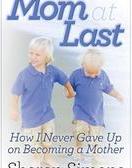(CBS News) Amid a recession, the birth rate in the United States has been falling – but not for all women.
U.S. birth rates declined about 16 percent among women ages 15 to 24 between 2007 and 2010, according to the Centers for Disease Control and Prevention (CDC). Similarly, among women 25 to 29 rates went down more than 8 percent, and among women 30 to 39 rates decreased about 4 percent.

But, when it came to women aged 40 to 44, rates rose more than 6 percent during this time. These trends continue a pattern among women of starting their families later than their mothers did that’s been underway for decades, according to Elizabeth Gregory, director of women’s studies at the University of Houston and research fellow on the Council on Contemporary Families. In 1970 the average age at first birth was 21, today it’s over 25.
Almost 40 percent of all U.S. babies in 2010 were born to women over 30, and almost 15 percent – 1 in 7 – were born to women 35 and over. One in four first births were to women 30 and over, and one in 12 were to women over 35.
Though women evidently see virtues in delay, that hasn’t been the case with public perception. Instead of clear analysis, there’s a lot of misinformation, both about why women are delaying and what the effects of fertility are for individual families and for society at large.
Gregory, author of “Ready: Why Women Are Embracing the New Later Motherhood,” breaks down seven common myths about late motherhood.
Myth: Women who delay are selfish about their careers
Gregory finds the opposite, and says later mothers aim to do well in their careers in order to support their kids. The current work-system effectively punishes women who have kids early on, she says, by holding their salaries low and limiting their opportunities to advance.
One study in the July 2011 Journal of Population Economics found that college-educated women gain 12 percent in long-term earnings per year of delay. That means a woman who starts her family at 30 makes about twice as much in the long term as she would if she had started her family at 22, and so on with each additional year of delay. The average female college grad (of any race) starts her family at 30 and many wait longer, according to the CDC.
Myth: Women who delay motherhood past 35 are unlikely to ever get pregnant
It is true that fertility declines after 35, and it often takes longer for a couple to conceive. But Gregory says that news stories about fertility tend to exaggerate in both directions, overstating the rate of fertility decline or failing to note that some older mothers have used donor eggs. In 2010, 580,000 babies were born to women 35 and over in the U.S. Less than 5 percent of these involved IVF and egg donation, according to a CDC report.
It’s hard to gather firm data on age-based fertility decline because researchers can’t ask large groups of people to try constantly to get pregnant over decades, says Gregory. But, a study that looked at Hutterites, a branch of the Anabaptists whose religious leaders asked them procreate as much as possible, found that almost 90 percent of 35-year-old women can have kids without aid, roughly two-thirds can do so through 39, and about half at 41. Rates plummet thereafter, and few women have children after age 44 with their own eggs.
Continue Reading the Commons Myths on Motherhood over 40

